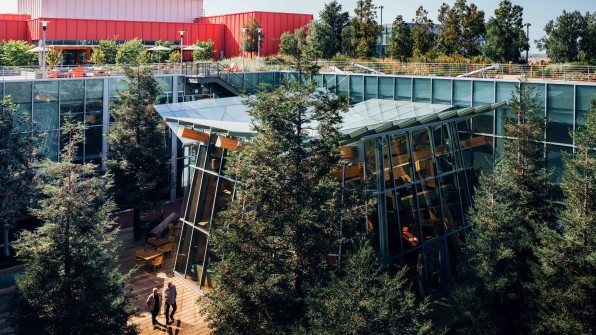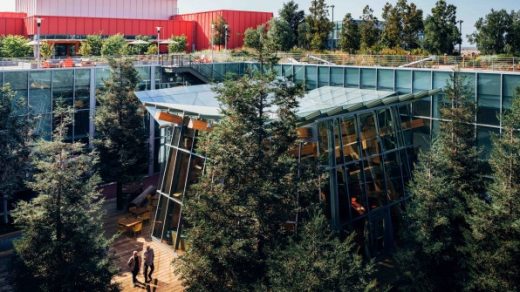Facebook unveils a glossy new Frank Gehry-designed office
Facebook unveiled its newly expanded headquarters in Menlo Park, California, this week—and the giant master-planned development called MPK21, designed by starchitect Frank Gehry, has all the bells and whistles of today’s tech campuses, for lack of a better word, and then some.
Completed in just 18 months, the 525,000 square foot, LEED Platinum certified expansion boasts a 3.6-acre rooftop garden with more than 200 trees, and a half-mile long pathway that meanders through to evoke the feel of a walk through the park. A sheltered green space, called the “Town Square,” joins MPK21 to the existing MPK20, which Gehry also designed and completed in 2015, along with a courtyard with amphitheater seating called “The Bowl,” surrounded by 40-foot-tall redwood trees.
The employee experience suggested by images and descriptions of the sprawling private property, complete with five unique dining options and a sunken garden, is that this is a place where people should like to live or retreat, rather than work. There’s no shortage of benign buzzwords or self-congratulatory messaging in the video spot. “We’re a culture of builders,” says Janelle Gale, VP of Human Resources. “Part of that is even building our internal space.”

Like Facebook, other big tech companies—including Square, which has described its San Francisco HQ as having “avenues” and a “town square”—have commonly evoked this nostalgia-tinged analogy of urban planning to the point of cliche. Yet this rhetorical marketing device highlights the detached microcosm it has planted within the city. A real avenue is trafficked by people from all walks of life within the context of a city, not just from one office building to another; it exists in a context beyond its contained self, where its inhabitants aren’t vetted, recruited, paid handsomely–or causing a housing crisis for the whole region. Through its imagery and rhetoric, Facebook’s expansion stands as an attempted revival of the traditional company town: a social engineering approach that extends offline, yet remains neatly confined and packaged as a perk for its staff—at least for now.
Mk21 is just a hint of Facebook’s wider ambitions to be seen as a positive presence for the South Bay city. Among the detailed embarrassment of riches, the tech giant also shared plans to develop a public, two-acre park and event space, replete with bike paths, a plaza, and a pedestrian walkway for the wealthy South Bay community. Following Facebook’s earlier announcement this year to develop Willow Village—which includes plans to include amenities such as a pharmacy, grocery stores, and more—it seems Facebook’s development spree is just getting started. Yet for many tech companies and particularly for Facebook, winning back an earnest public image both online and IRL will take more effort than the promise of nurturing public-facing development.
“As Facebook grows its headquarters in Menlo Park, California, we strive to create a unique workplace and be a good neighbor,” writes John Tenanes, VP of Global Facilities and Real Estate, in a Newsroom post. Do good fences make good neighbors, or would Menlo Park welcome a Facebook-led public development? We’ll have to wait to hear from local residents before the social media giant’s next growth spurt. For now, MPK21 does make Facebook a great neighbor to one Menlo Park resident: itself.
Fast Company , Read Full Story
(47)


